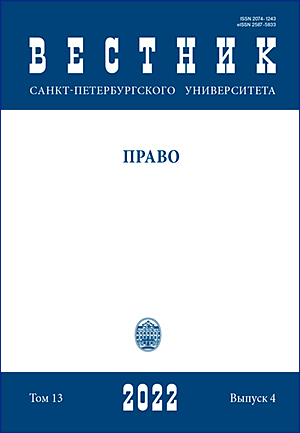Modification or termination of contracts due to international economic sanctions from the standpoint of Russian legislation and court practice
DOI:
https://doi.org/10.21638/spbu14.2022.403Аннотация
In this article the author covers the problem of possible modification or termination of contracts due to international economic sanctions, in particular the US and EU sanctions against Russia. The author analyses relevant legislative acts, approaches of governmental authorities and court practice on this matter. This extensive analysis includes overview of development of main legal doctrines and institutions, related to the subject matter of this article. Moreover, it covers definitions of the relevant terms. This article is mainly aimed at defining a list of criteria to rely on when determining the possibility to modify or terminate a contract due to international economic sanctions in each particular case. The author raises the hypothesis that possibility to modify or terminate a contract due to international economic sanctions is subject to a closed list of criteria. The subject matter of this article is important since sanctions are now one of the main instruments of political influence in interstate relations and have a significant impact on all types of contractual relationships. Today, a major and common challenge faced by market participants is the inability to enforce contracts the way they were originally entered into. Due to the fact that in Russia it is rare for contracts to be amended or terminated due to newly imposed sanctions, parties do not always find themselves in a position to enforce a contract in a timely manner or to perform at all. As a result, the stability of the business environment is disrupted and the level of trust is reduced. Thus, it is highly important to perform a thorough analysis of this matter and provide possible solutions for market participants.
Ключевые слова:
international economic sanctions, sanctions, clausula rebus sic stantibus, substantial change of circumstances, contracts, hardship
Скачивания
Библиографические ссылки
Загрузки
Опубликован
Как цитировать
Выпуск
Раздел
Лицензия
Статьи журнала «Вестник Санкт-Петербургского университета. Право» находятся в открытом доступе и распространяются в соответствии с условиями Лицензионного Договора с Санкт-Петербургским государственным университетом, который бесплатно предоставляет авторам неограниченное распространение и самостоятельное архивирование.






